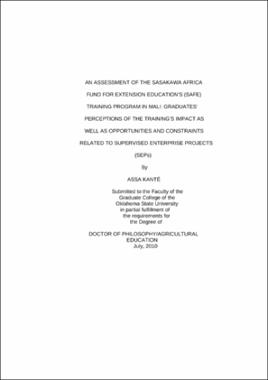| dc.contributor.advisor | Edwards, Craig | |
| dc.contributor.author | Kante, Assa | |
| dc.date.accessioned | 2013-11-26T08:22:19Z | |
| dc.date.available | 2013-11-26T08:22:19Z | |
| dc.date.issued | 2010-07 | |
| dc.identifier.uri | https://hdl.handle.net/11244/6561 | |
| dc.description.abstract | Scope and Method of Study: The sample for this descriptive study included 50 mid-career Extension professionals who had completed the Sasakawa Africa Fund for Extension Education (SAFE) training program in the Republic of Mali (West Africa). The study assessed perceptions of SAFE graduates regarding the training's impact on their professional performance and related behaviors of the graduates' clients. The study followed a triangulation mixed methods design (Creswell, 2005), which included using a survey instrument and conducting semi-structured focus group interviews to collect data. | |
| dc.description.abstract | Findings and Conclusions: Most of the study participants were Muslim males who averaged nearly 47 years of age and 17 years of experience in Extension. Participants served in seven of the eight administrative regions of Mali and in the District of Bamako. Seven-in-ten participants had entered the SAFE training program with a Technician degree and specialization in Agriculture. Participants perceived the training had a significant impact on their overall professional competence, and that the knowledge they acquired increased their effectiveness and satisfied their training needs. All of the graduates were upgraded to an advanced job category after completing the training. Nearly two-thirds indicated they observed changes in their clients' practices attributed to the SAFE training. Significant associations and relationships (p < .05) between selected personal and professional characteristics of graduates, between their characteristics and selected perceptions, as well as between their selected perceptions were revealed. Male graduates were significantly more likely to still be Extension educators. In addition, graduates overall satisfaction with their SAFE training experience was significantly related to their willingness to encourage a colleague to participate in the training. Qualitative findings revealed that the graduates' experiences with Supervised Enterprise Projects (SEPs) overall was positive and useful. However, some issues and concerns regarding SEPs emerged, including cost, supervision, as well as standards regarding project reporting and thesis writing. | |
| dc.format | application/pdf | |
| dc.language | en_US | |
| dc.rights | Copyright is held by the author who has granted the Oklahoma State University Library the non-exclusive right to share this material in its institutional repository. Contact Digital Library Services at lib-dls@okstate.edu or 405-744-9161 for the permission policy on the use, reproduction or distribution of this material. | |
| dc.title | Assessment of the Sasakawa Africa Fund for Extension Education's (SAFE) training program in Mali: Graduates' perceptions of the training's impact as well as opportunities and constraints related to Supervised Enterprise Projects (SEPs) | |
| dc.contributor.committeeMember | Blackwell, Cindy | |
| dc.contributor.committeeMember | Key, James | |
| dc.contributor.committeeMember | Henneberry, Shida | |
| osu.filename | Kante_okstate_0664D_11061.pdf | |
| osu.accesstype | Open Access | |
| dc.type.genre | Dissertation | |
| dc.type.material | Text | |
| thesis.degree.discipline | Agricultural Education | |
| thesis.degree.grantor | Oklahoma State University | |
